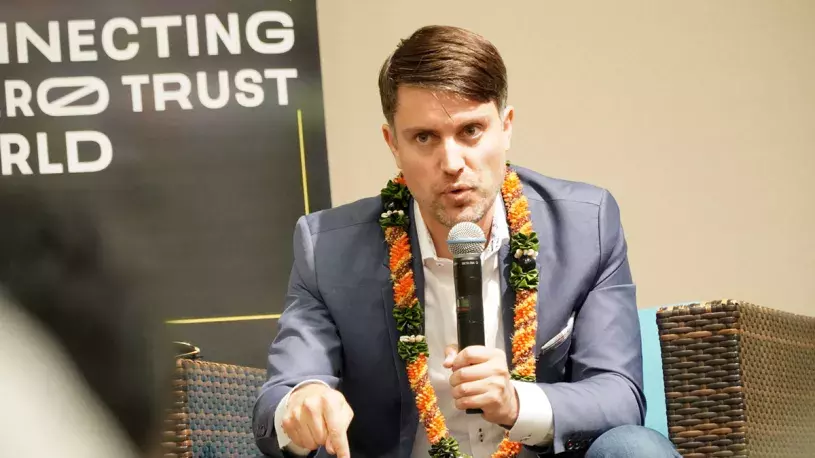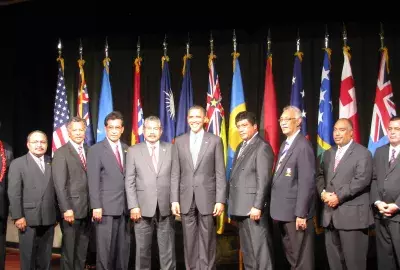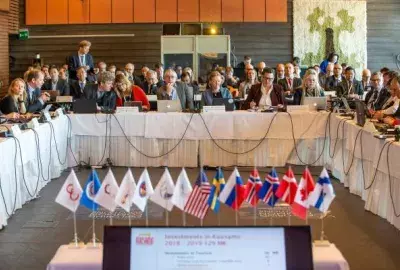Error message

OFFICE/DEPARTMENT
Meta’s head of security policy describes the hunt for the worst bad-influencers
HONOLULU (July 14, 2022) -- At the recent East-West Center International Media Conference here on “Connecting in a Zero-Trust World,” multiple speakers laid ultimate blame for a variety of social crises worldwide, from rampant misinformation and the rise of extremism to existential threats to democracy itself, on the moneymaking models of big social media platforms. So it took a certain degree of poise when Nathaniel Gleicher, head of security policy for Meta—the newly renamed megacompany behind Facebook, Instagram, and WhatsApp—took the stage for a lunchtime Q&A session to describe what the company is trying to do to counter some of the worst online “bad actors” who target journalists and other people in positions of influence.
“The nature of the world we face today, the rise of illiberal voices, the rise of autocracies around the world—many of these trends predate the internet,” Gleicher said. “But one of the things the internet does, and social media does, is connect people. And by connecting people, it accelerates all of these trends.”
‘Determined adversaries’
An engineer and lawyer who has been working in online security for 15 years, Gleicher said he joined Meta, one of the media conference’s sponsors, in 2018. The company was dealing with the aftermath of the 2016 US presidential election, during which Russian saboteurs had used social media, particularly Facebook and Instagram, to spread disinformation and sow distrust in American democracy. His role, he said, involves coordinating work across the company to “track and counter” such “determined adversaries.”
“For a lot of content moderation, you're drawing boundaries and lines—what should be permitted, what shouldn't,” he said. “But for a certain subset of problems, there is an adversary on the other side, who isn't just making a mistake. They’re repeatedly, intentionally, and systematically trying to abuse your systems, trying to cause harm across the internet, and trying to mislead or target our users.”
‘Inauthentic behavior’
Meta now issues a quarterly Adversarial Threat Report that focuses on what the company calls “CIB” or “coordinated, inauthentic behavior”—organized networks of fake social media accounts that Gleicher said seek to “mislead people about who's behind them and use that deception to manipulate or corrupt public debate.”
After dismantling such networks on Meta’s platforms, Gleicher’s team then publishes information about who is behind these coordinated efforts, what tactics they are using, what types of content they are sharing, and the kinds of people they are targeting. The reports have expanded to track other types of threats as well, including hacking and cyber espionage, along with efforts to silence the voices of targeted journalists, women, and others.
"One of the most effective tools is to find and identify repeat offenders, the most aggressive actors that repeatedly coordinate to drive this harm,” he said. “And don't just take them down, but take them down publicly, make sure people see what happens, and share information about that type of activity so that other defender teams can take similar actions.”
The goal, Gleicher said, is to expose the malevolent actors’ techniques so they become less effective—without sowing even further mistrust. “We are always thinking, ‘how do we do this in a way that doesn't hyperbolize the problem and that doesn't essentially do the bad guys work for them?’” he said.
Journalists under threat
Gleicher outlined three of the biggest threats that journalists face online, including efforts made to compromise their accounts, harassment, and efforts to target them directly as “vehicles for influence operations.”
“[Journalists] have an incredibly powerful reservoir of legitimacy and authority,” he said. “And so we see threat actors try to piggyback on that.”
Journalists such as conference headliner Maria Ressa, a Nobel Peace Prize winner who has been attacked by both the Philippines government and coordinated mobs of online “trolls,” are victims of what Gleicher called “brigading” efforts to silence them, often using “closed” members-only Facebook groups to mobilize attacks. “In some ways, it doesn't matter if the person they're targeting is a good person or a bad person,” he said. “When you target and silence someone, it's not just that they get silenced. Everyone who identifies with them or looks like them also gets silenced.”
Gleicher said his team has recently launched a new program to investigate and take enforcement action against such efforts to “brigade and harass” influential figures.
Personal resources
For personal online safety, he stressed the importance of enabling two-factor authentication to access social media accounts and promoted the Facebook Protect program, which is designed to “give additional defenses to highly-targeted voices.” Facebook also offers a Women’s Safety Hub with tools that women who are being harassed online can use to take matters into their own hands, including silencing certain hashtags.
Gleicher conceded that “on a platform of two and a half billion users, a small number of people can cause a lot of harm.” But “platforms working together with governments, civil society and the media can be a very effective team at countering these threats.”
Meta’s head of security policy describes the hunt for the worst bad-influencers
HONOLULU (July 14, 2022) -- At the recent East-West Center International Media Conference here on “Connecting in a Zero-Trust World,” multiple speakers laid ultimate blame for a variety of social crises worldwide, from rampant misinformation and the rise of extremism to existential threats to democracy itself, on the moneymaking models of big social media platforms. So it took a certain degree of poise when Nathaniel Gleicher, head of security policy for Meta—the newly renamed megacompany behind Facebook, Instagram, and WhatsApp—took the stage for a lunchtime Q&A session to describe what the company is trying to do to counter some of the worst online “bad actors” who target journalists and other people in positions of influence.
“The nature of the world we face today, the rise of illiberal voices, the rise of autocracies around the world—many of these trends predate the internet,” Gleicher said. “But one of the things the internet does, and social media does, is connect people. And by connecting people, it accelerates all of these trends.”
‘Determined adversaries’
An engineer and lawyer who has been working in online security for 15 years, Gleicher said he joined Meta, one of the media conference’s sponsors, in 2018. The company was dealing with the aftermath of the 2016 US presidential election, during which Russian saboteurs had used social media, particularly Facebook and Instagram, to spread disinformation and sow distrust in American democracy. His role, he said, involves coordinating work across the company to “track and counter” such “determined adversaries.”
“For a lot of content moderation, you're drawing boundaries and lines—what should be permitted, what shouldn't,” he said. “But for a certain subset of problems, there is an adversary on the other side, who isn't just making a mistake. They’re repeatedly, intentionally, and systematically trying to abuse your systems, trying to cause harm across the internet, and trying to mislead or target our users.”
‘Inauthentic behavior’
Meta now issues a quarterly Adversarial Threat Report that focuses on what the company calls “CIB” or “coordinated, inauthentic behavior”—organized networks of fake social media accounts that Gleicher said seek to “mislead people about who's behind them and use that deception to manipulate or corrupt public debate.”
After dismantling such networks on Meta’s platforms, Gleicher’s team then publishes information about who is behind these coordinated efforts, what tactics they are using, what types of content they are sharing, and the kinds of people they are targeting. The reports have expanded to track other types of threats as well, including hacking and cyber espionage, along with efforts to silence the voices of targeted journalists, women, and others.
"One of the most effective tools is to find and identify repeat offenders, the most aggressive actors that repeatedly coordinate to drive this harm,” he said. “And don't just take them down, but take them down publicly, make sure people see what happens, and share information about that type of activity so that other defender teams can take similar actions.”
The goal, Gleicher said, is to expose the malevolent actors’ techniques so they become less effective—without sowing even further mistrust. “We are always thinking, ‘how do we do this in a way that doesn't hyperbolize the problem and that doesn't essentially do the bad guys work for them?’” he said.
Journalists under threat
Gleicher outlined three of the biggest threats that journalists face online, including efforts made to compromise their accounts, harassment, and efforts to target them directly as “vehicles for influence operations.”
“[Journalists] have an incredibly powerful reservoir of legitimacy and authority,” he said. “And so we see threat actors try to piggyback on that.”
Journalists such as conference headliner Maria Ressa, a Nobel Peace Prize winner who has been attacked by both the Philippines government and coordinated mobs of online “trolls,” are victims of what Gleicher called “brigading” efforts to silence them, often using “closed” members-only Facebook groups to mobilize attacks. “In some ways, it doesn't matter if the person they're targeting is a good person or a bad person,” he said. “When you target and silence someone, it's not just that they get silenced. Everyone who identifies with them or looks like them also gets silenced.”
Gleicher said his team has recently launched a new program to investigate and take enforcement action against such efforts to “brigade and harass” influential figures.
Personal resources
For personal online safety, he stressed the importance of enabling two-factor authentication to access social media accounts and promoted the Facebook Protect program, which is designed to “give additional defenses to highly-targeted voices.” Facebook also offers a Women’s Safety Hub with tools that women who are being harassed online can use to take matters into their own hands, including silencing certain hashtags.
Gleicher conceded that “on a platform of two and a half billion users, a small number of people can cause a lot of harm.” But “platforms working together with governments, civil society and the media can be a very effective team at countering these threats.”
Web Article
Recent online articles and analysis that have been published on the East-West Center website.







